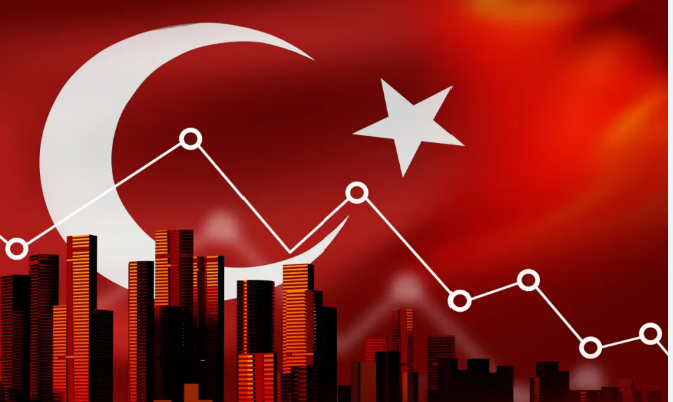Ankara jacked up its inflation forecasts and cut those of economic growth on Wednesday, as President Tayyip Erdogan appeared to endorse the big interest rate hikes that are driving a turnaround toward more orthodox policies, in a document called the “Medium Term Economic Program (MTEP).
The government said it sees annual inflation rising to 65% by year end before dipping to 33% next year, up from 24.9% and 13.8% respectively in forecasts it published a year ago.
It trimmed GDP growth forecasts to 4.4% this year and 4% next year – which is still higher than most economists expect – from 5% and 5.5% previously. The current account deficit is expected to be $42.5 billion in 2023 and $34.7 billion in 2024.
In the 78-page economic program unveiled on Wednesday, the government said “monetary, fiscal and tax policies will be coordinated by prioritizing price stability”.
That marks a break with the pre-election era, when a stream of rules were introduced to keep the economy on an even keel without raising interest rates, commented Adam Watson at FT.
Inflation is set to fall to 33 per cent by the end of next year and reach single digits by the end of 2026. The government also expects growth to slow this year, with gross domestic product expanding 4.4 per cent compared with 5.5 per cent in 2022.
Erdoğan also gave the strongest signal yet that policymakers were planning to unwind a vehicle in which the government compensates depositors on $128bn-worth of savings when the lira depreciates, saying the government would “pave the way” for the “conversion” of these deposits.
Economic activity in the first quarter was affected by massive earthquakes that hit the country’s south and southeast on Feb. 6, killing more than 50,000, toppling hundreds of thousands of buildings and seriously damaging the region’s infrastructure.
Reconstruction efforts are expected to cost more than $100 billion. During the medium-term program, Erdoğan said around TL 3 trillion will have been allocated for the earthquake region.
The unemployment rate is forecast to decrease to 10.3% next year, 9.9% in 2025, and 9.3% in 2026.
The program sees exports reaching $255 billion in 2023 and jumping to as high as $302.2 billion in 2026.
Tourism income is forecast to total $55.6 billion this year and surge to around $71.3 billion in 2026.
Türkiye’s current account deficit-to-GDP ratio is expected to fall to 4% in 2023, from 5.3% in 2022, and to 2.3% in 2026.
Erdogan’s latest comments are a signal he’s “very supportive” of Simsek and Erkan, according to Timothy Ash, an emerging-markets analyst at RBC Bluebay Asset Management. Still, it’s possible that “the economic challenges are now just too difficult even from the A team to resolve.”
Turkey needs “much higher” rates and to quickly get an “external anchor” in the form of funding from the International Monetary Fund or Gulf states, according to Ash.
On Wednesday, Erdogan said his administration would curb consumer demand. But he won’t “make concessions on economic growth,” he said, as the government revised down its targets in a Medium-Term Program presented around the same time.
Perhaps the most positive aspect of the MTEP is the fact that President Erdogan owned up to it. Signaling an irreversible U-turn from heterodox economic policies.
Yet, the program is mostly wishful thinking. Turkey’s non-inflationary GDP growth potential is estimated at 3-3.5% per annum, meaning that restraining inflation and current account deficits at the higher growth rates envisioned in the MTEP is not feasible.
Those figures are “slightly optimistic,” analysts at Turkish Oyak Securities said, without elaborating.
With Erdogan’s ruling AK Party seeking to reclaim big cities Istanbul and Ankara from the opposition in the March vote, some analysts say higher inflation and unemployment and lower growth could test the president’s patience with the U-turn.
Erdogan has fired four central bank governors in four years. His past push to slash rates despite rising prices led to a historic currency crash in late 2021 and sent inflation to a peak above 85% last year.
“The risk is ever-present that…Erdogan could lose patience,” said Commerzbank analyst Tatha Ghose. Inflation will “be very high for an extended period of time, which will trigger second-round effects such as wage settlements.”
Another much-advertised dimension of the MTEP, structural reform, turned out to be nothing than the re-hashing of old ideas which would have minimal impact on economic performance, even if they can be properly executed.
According to Turkish economists commenting on the Program in X, formerly Twitter, pointed to the exchange rate forecasts implicit in GDP and current account calculations, estimating TL will lose 50% vs USD in the next 12 months. How the economy team would reconcile such a high rate of deprecation with 33% inflation is another question that goes unanswered.
By Atilla Yesilada
Follow our English language YouTube videos @ REAL TURKEY: https://www.youtube.com/channel/UCKpFJB4GFiNkhmpVZQ_d9Rg
And content at Twitter: @AtillaEng
Facebook: https://www.facebook.com/realturkeychannel
